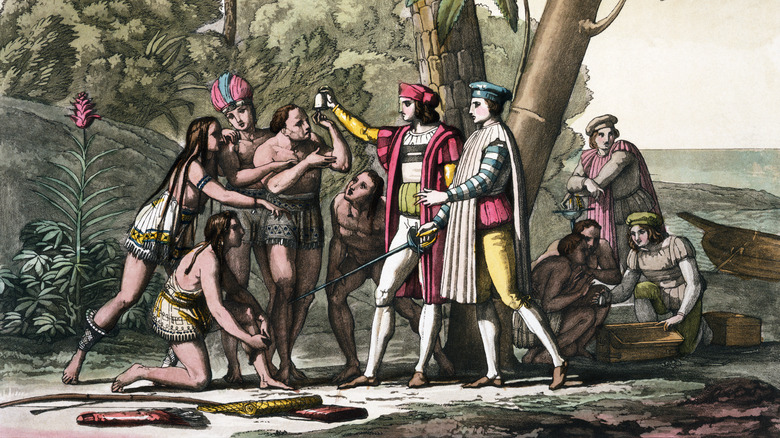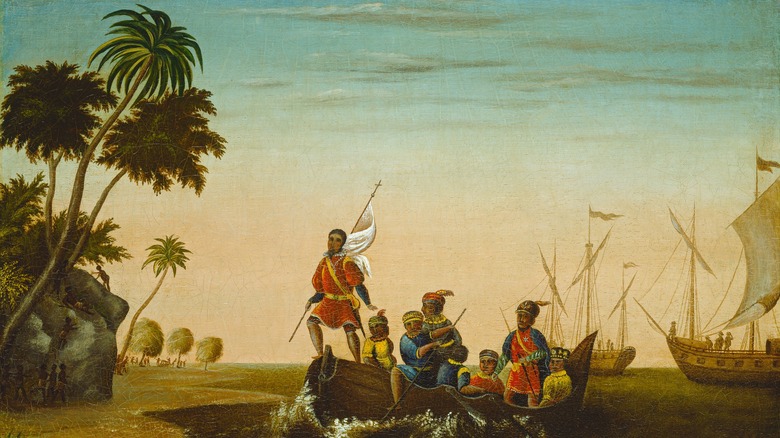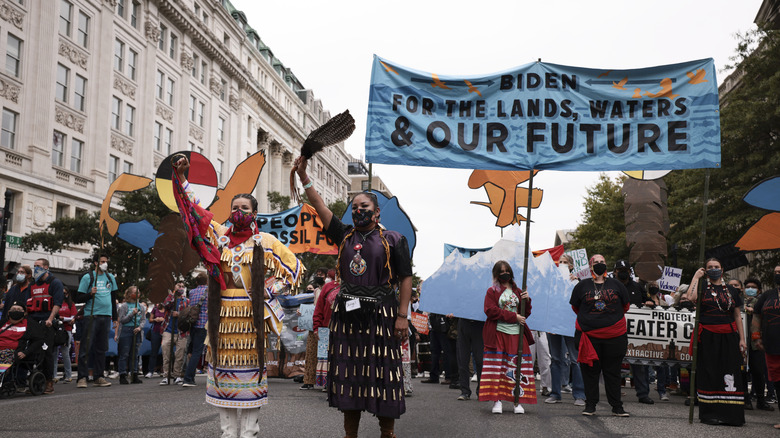Why Columbus Day And Indigenous Peoples' Day Are The Same Day
Columbus Day is a relatively new holiday — founded by Franklin D. Roosevelt in 1934 — and there are signs it may already be on its way out, less than a century later. Although the issue remains divisive, on the whole, Christopher Columbus' reputation has diminished among younger generations.
Roosevelt's decision to create the holiday came after support for the celebration gathered pace in the early 20th century. The 400th anniversary of Columbus' landing was first celebrated at the World's Fair in 1892, and after that, a Catholic fraternal organization known as the Knights of Columbus pushed to make it a permanent holiday. In more recent times, the holiday has divided public opinion, however. According to a public opinion poll published in the Los Angeles Times in 1992, for example, 64% of Americans said they regarded Columbus as a hero, and just over half said they believed the day should remain a national holiday. These numbers have remained fairly consistent in more recent polls up to the present day, however, according to Bloomberg, among students, 69% of those polled in 2019 did not believe Americans should be celebrating Columbus Day at all.
With that said — who wants to give up a holiday? But there is another option available. The defiant decision to celebrate Indigenous People's Day instead came about at the United Nations-backed discrimination conference in 1977, and the idea has steadily gained traction ever since. The number of states embracing the new holiday has risen dramatically in recent years, signaling that Columbus's day may one day cease to exist.
Arguments against Columbus Day
Although it is understandable that ordinary Americans wish to celebrate the birth of their country — Christopher Columbus is possibly not the best figure to use as a national symbol. Columbus was a morally grey character at best — and arguably a complete monster at worst.
During Columbus' initial encounter with the indigenous people of the Americas, his first thoughts revolved around conquest, assimilation, and servitude. In his own writings, he spoke of the people he encountered as though they were chattel, stating "It appears to me, that the people are ingenious, and would be good servants," and "I could conquer the whole of them with fifty men, and govern them as I pleased." For many, Columbus' landing marked the beginning of the genocide and enslavement of indigenous people and is therefore not something to be celebrated.
Then of course there is the thorny issue that Columbus didn't actually discover America at all. As far as Europeans are concerned, he wasn't the first person to find the far-flung landmass. That honor should really go to Lief Erikson, the Viking explorer who found the mysterious continent of "Vinland" on his travels, and who has a day of his own, on October 9th.
Indigenous People's Day gains supporters
There is good reason to believe that one day Columbus Day may cease to exist altogether. USA Today reports that Berkeley and Santa Cruz in California both opted to switch to Indigenous People's Day way back in 1989 and by the 1990s, the International Conference on Discrimination Against Indigenous Populations began to push for the widespread adoption of the new day, replacing Columbus' dark legacy of colonialism, with a celebration of the often marginalized Native Americans. And the idea has definitely caught on.
According to the Indian Youth organization, although many jurisdictions have opted to celebrate both holidays on the same day, others have expunged Columbus from their festive rosters entirely. Leading the charge, many cities in the states of Washington, Oregon, Oklahoma, Minnesota, and New York have permanently made the switch, and various cities in many other states have joined them as well.
Perhaps the biggest sign that change is on the horizon has come from President Joe Biden, now officially the first president in history to officially mark the day with a public proclamation. On Indigenous People's Day in 2021, he wrote "For generations, Federal policies systematically sought to assimilate and displace Native people and eradicate Native cultures ... Today, we recognize Indigenous peoples' resilience and strength as well as the immeasurable positive impact that they have made on every aspect of American society" (via AP News). His message was warmly welcomed by many indigenous Americans.


